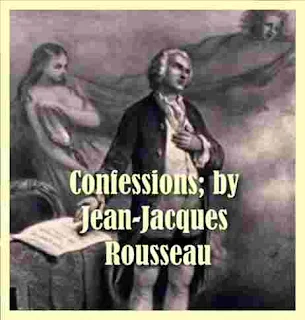Confessions; by Jean-Jacques Rousseau (1923) PDF ebook
Confessions; by Jean-Jacques Rousseau
 |
| Jean-Jacques Rousseau |
Yet it is a fact that the peculiar romantic interest in personality which has drenched literature ever since, had its first important expression in Rousseau. Hitherto before the latter half of the eighteenth century, the most violent emotions of men had tended to crystallize in objective works of art, as the passionate storms of Swift were compressed into pamphlets and satires and the sensibility of Racine was chiseled in the marble of classical tragedies.
But at the advent of Rousseau, with his new motto, Intus et in cute, the simple record of one's feelings and impressions became an end and a form in itself; you assumed that a thing was interesting, not by virtue of its absolute importance, but because it had happened to you, and you assumed that the things that happened inside you were more important than the things you actually did. When Byron comes to vent his emotions he will produce no really objective masterpiece, like Swift or Racine; he will merely give out a strong emanation of personality, the smoky fumes of escaping passions, an attitude, a pose, a temperament, abounding simply in the sense of its own will.
The very phenomena of the landscape and the seasons which have hitherto been regarded as rather uninteresting will be absorbed by the subjective life till they seem almost to share some sympathy with it.
On one of the very first pages of the Confessions Rousseau tells of hearing the swallows which had come twittering outside the window when as a boy he had sat up all night reading, and, as Sainte-Beuve has said, they announced more than the coming of morning : they were the heralds of the whole flamboyant summer of modern romanticism.
Contrast Rousseau s Confessions with Voltaire's autobiographical fragment a typical document of the eighteenth century: the brisk bright running notes of the latter are all of public affairs and public people; when they decline from an impersonal attitude it is only for a tincture of malice. But in Rousseau it is Rousseau we hear about, rarely ever society or politics; and we some times get the impression that Rousseau s individual soul is more precious than either politics or society.
Yet it is precisely Rousseau s political and social eminence that makes his Confessions the most important book of their kind. Never has a figure of equal significance left a record equally candid and complete.
We shall best appreciate them if we regard them not merely as a picaresque narrative nor as one of the frankest and most fascinating documents on the life of the eighteenth century, but chiefly as the soil of experience which fed the roots of a great tree of political impulse a tree which with rude natural strength split the neat pavements of a feudal society and now more than a hundred years after spreads its ramifications through the world. For, though among the philosophers and journalists of the Enlightenment there were many cleverer and more accomplished than Rousseau, there was none who commanded a more formidable power.
They, like him, were bent upon the destruction of the ancien regime, but they were inextricably bound up with it; after all, in accepting its culture and in mingling with its society, they were aristocratic themselves. But Rousseau had come in from outside, he had struggled up from below; he was a Swiss, a provincial and a Protestant in a society where even the opposition was French, Catholic and urbane. He was the real witness for the people, the man who had really seen the social structure from belowstairs; and no deficiencies of education, no faults of taste or confusions of logic could ever nullify the superiority of the force which he derived from his unique position.
Here again he will seem less striking to us nowadays than he did to his own time. We are used to Rousseaus now: they start up on every hand; they are the leaders of the labor movements and the voices of the liberal press.
H. G. Wells, for example, is nothing more nor less than Rousseau a hundred years after you have the same romantic fever, the same dazzling political visions, the same imperfect cultural equipment in a mind extremely well informed and the same inflaming of social theories by obsessions of personal resentment; Tono- Bungay and The New Machiavelli have really much in common with the Confessions, as the spirit of Joan and Peter has with that of Emile; and it is even possible to recognize in the imperfect sympathy between Wells and Shaw a repetition of the conflict of temperaments between those two other great leaders on the same side, Rousseau and Voltaire. Like Rousseau, Wells is a rhapsodist, a democratic prophet; like Voltaire, Shaw is an intellectual, disdainful of the confusions of emotion.
Translated by Edmund Wilson
Download Confessions 12 MB PDF ebook Volume 1









